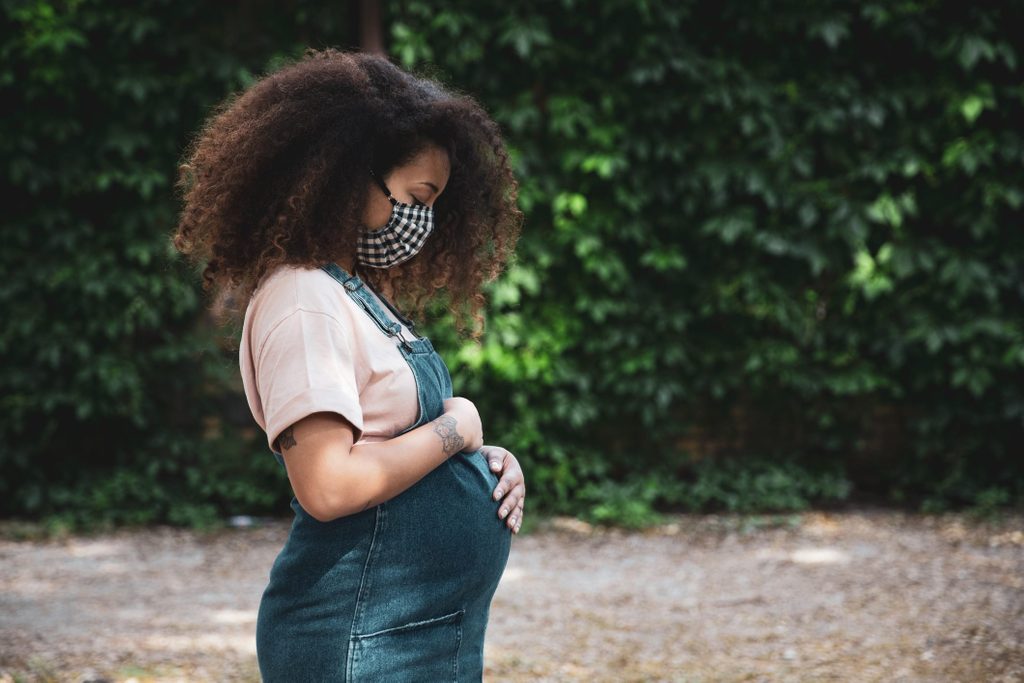Am I Crazy for Trying to Get Pregnant During a Pandemic?

I asked ob-gyns to weigh in on the risks of pregnancy and childbirth during the Covid-19 pandemic, specifically for Black expectant mothers.
Some might call us crazy, but my husband and I recently decided to start trying to get pregnant. Last year, we would’ve approached plans to grow our family with excitement and optimism. But so much has changed, and for many, the beauty of pregnancy and childbirth has now been overshadowed by the current pandemic and its perpetrator—the coronavirus. But it appears that I am far from alone.
Thousands of women are finding themselves with an unexpected bun in the oven or wrestling with making the hard decision of getting pregnant during such an uncertain and unprecedented time. Having a healthy and happy pregnancy and delivery right now isn’t impossible.
However, doctors caution both expectant moms and those who wish to be to take the necessary precautions to protect themselves and their baby. This is especially true for Black women who have historically experienced significant pregnancy and childbirth-related disparities.
The decision to grow a family during coronavirus
Anyone who knows me will tell you that I’m a notorious planner and preparing for our second child has been no different. My husband and I hoped to start trying for another baby in March, but then the pandemic hit. We thought that surely conditions would improve in the next six months. Well, we were wrong. Getting pregnant right now would involve frequent doctor visits, which would increase my exposure to the virus.
Over the last seven months, we had taken such thoughtful care to remain healthy only to now consider something that would put us at a much higher risk of Covid-19. To be honest, the thought of getting pregnant and having a baby during a pandemic made us cringe. But after researching successful pregnancies during the pandemic and consulting with ob-gyns, we decided we were equipped to take this calculated risk.
(Related: What Ob-Gyns Want You to Know About Fertility)
Pregnancy rates during coronavirus
The CDC reported that between January 22 and October 6 of this year, more than 25,000 women were diagnosed with the coronavirus while pregnant—almost 6,000 of whom were hospitalized and 44 subsequently died from the virus.
In May, the United Nations Children’s Fund estimated that 3.3 million babies will be born in the United States between March 11 and December 16. The organization warned that mothers would face various challenges such as lockdowns and overwhelmed health centers with overextended staff and limitations on resources.
The idea of having limited access to medical staff throughout a potential pregnancy and during and after childbirth has been one of the more difficult possibilities for me and my husband to reconcile.
One saving grace has been the few people we know who have recently given birth. They’ve shared how responsive and empathetic medical care workers have been during their pregnancies and childbirths.
Hearing these stories have served as a light at the end of the tunnel. We can only hope that we’ll have a similar experience.
In June, a CDC report found that pregnant women diagnosed with Covid-19 are more likely to be hospitalized, are at increased risk for admission to intensive care, and are more likely to be placed on a ventilator than women who aren’t pregnant, even though pregnancy doesn’t seem to raise the risk of death.
According to Laura Riley, an ob-gyn at New York-Presbyterian Hospital who chairs the department of obstetrics and gynecology at Weill Cornell Medicine, it’s important to remember that we still have a lot to learn about Covid-19 and pregnancy—other research has found that pregnancy doesn’t increase the likelihood of being hospitalized, she notes.
Having a higher risk of being hospitalized if diagnosed with the virus was one of the main reasons we waited until this point to try to get pregnant. Even as recent as last month, the risk of contracting the virus and then having to be admitted into the hospital was difficult to determine. We weren’t ready to take that chance until we learned that the percentage of fatalities is similar to that of non-pregnant women.
Despite the fact that newborns who have tested positive for the virus have presented with mild to no symptoms and have recovered, they still require immediate medical treatment and are at a higher risk of death compared to newborns who are virus-free. Although it remains unclear whether the virus can be transmitted from a mother to her baby, Riley suggests that expectant mothers follow proper CDC-recommended precautions to further protect themselves and their newborns.
Covid-19 risks are higher for Blacks
In a 2020 State of Black America report from the National Urban League, researchers found that Blacks are three times more likely to contract the virus than whites: The infection rate for Blacks is 62 per 10,000 compared with 23 per 10,000 for whites.
One in 1,020 Black Americans have died from the virus compared to one in 2,150 whites. These startling statistics are alarming and carry severe implications for pregnant Black women, which is another reason my husband and I delayed pregnancy for so many months.
Numerous factors contribute to making members of the Black community more vulnerable to the virus and more likely to experience severe or even fatal outcomes. According to the Centers for Disease Control and Prevention (CDC), people with pre-existing health conditions such as diabetes, obesity, and asthma are more likely to be hospitalized or to die after contracting the virus.
These are medical conditions that are more common in the Black community, says Riley.
Poverty and a lack of access to quality medical care and health insurance further exacerbate the prevalence of these medical conditions and impacts the medical attention that many Blacks receive.
In the United States, about 14 percent of Blacks are uninsured compared to about nine percent of whites. “Poverty and lack of insurance can also impact Covid-19 care that Blacks receive as well as access to testing,” says Riley.
Pregnancy disparities among Black women
Another health disparity that has severely impacted the Black community is maternal death and pregnancy-related complications. Each year, around 700 women die in the United States from pregnancy or a related complication.
However, Black women are two to three times more likely to die from a pregnancy-related cause than white women. Although the numbers have slightly declined over the past three years, Black mothers overwhelmingly represent the largest maternal death rates.
Laura Sienas, an American College of Obstetrics and Gynecologists fellow and a maternal-fetal medicine fellow at the University of Washington, points out that this only increases with age.
Age has been my Achilles heel. When I was pregnant with my daughter I was 36-years-old. At the time, I was referred to as a high-risk pregnancy for no other reason than my age. That was two years ago, and here we are trying for baby number two in a pandemic.
My age was cause for slight caution two years ago and the pandemic has only added insult to injury. However, my age was also one of the factors that led us to make this decision.
Let’s face it: I’m not getting any younger, and the older a woman is the more her chances of experiencing complications during pregnancy increase. This is especially the case for Black women like myself.
Equally troubling, says Riley, is that “although most pregnancy-related deaths are preventable, racial and ethnic disparities in pregnancy-related deaths have persisted over time.”
Relatedly, Black women also experience higher rates of hypertension and diabetes—conditions that can increase the risk of gestational diabetes and preeclampsia, Sienas adds. There are a variety of additional conditions that have been linked to maternal death during and after pregnancy, such as cardiomyopathy, cardiovascular and coronary conditions, hemorrhaging, postpartum infection, and embolism.
“Most of these conditions are preventable or treatable,” says Riley, “but similar to Covid-19, they are worsened by poverty, lack of access to care, and the impact of institutionalized racism on quality health care”—all of which disproportionately affect Black women.
Black women are also almost three times more likely than white women to delay prenatal care, which places Black women at a much higher risk of increased maternal mortality rates.
(Related: The Forces That Shape Health Care for Black Women)
Racism in health care
Racism in health care and exposure to racism in everyday life also contributes to the increased numbers of Black women who die during childbirth and experience other pregnancy-related complications. Likewise, the impact of racism also contributes to Blacks being more vulnerable to the novel coronavirus (SARS-CoV-2).
Experiences with racism both within as well as outside of the health care system can dramatically impact medical help-seeking behaviours in the Black community, says Neel Shah, MD, ob-gyn, Beth Israel Deaconess Medical Center and director of the Delivery Decisions Initiative at Ariadne Labs. It can also place Blacks at an increased health risk to various medical conditions. Although I have never experienced racial bias in medical treatment, I know that I’m not exempt from it happening to me, which was another reservation that initially paused our decision to have another child.
Our fear was that—with the weight of limited staff, long hours, and highly stressful circumstances—we would find ourselves being cared for by medical staff who do not have their biases in check. This made us put it into high gear to find an ob-gyn who we could trust to not only provide consistent, quality, and effective treatment, but also to advocate on our behalf if necessary.
Ultimately, we selected a Black ob-gyn who we felt would better connect to some of our experiences and concerns during such a sensitive and stressful time.
A 2017 survey conducted for Harvard T.H. Chan School of Public Health found that 32 percent of Black people feel they’ve been discriminated against by their doctors. Black moms tend to receive different, if not worse, medical and prenatal treatment than white moms regardless of their socioeconomic status.
Because Black women experience both racial and gender-based discrimination, their exposure to racism and discrimination tends to exceed that of any other group. Exposure to racism in everyday life causes many Black women added stress during pregnancy and also negatively affects their health before becoming pregnant, which in turn, can increase the chances of them experiencing negative maternal health outcomes.
What expectant moms can do
Finding out that you’re pregnant or making the decision to plan a pregnancy can be scary under normal circumstances—much less, during a pandemic. But Riley and other medical experts say that there are steps that expectant mothers can take to reduce the risk of contracting the virus and to have a safe and healthy pregnancy and childbirth even if infected.
Make sure you have quality medical care and insurance
“Securing quality medical care and insurance is critical to properly monitor the overall health and progression of the pregnancy,” says Riley.
Be educated and empowered
Educating yourself about pregnancy-related complications, Covid-19, and virus-related precautions are equally as important. It’s important for moms—especially Black mothers—to feel empowered to ask their doctors questions and to properly advocate for themselves and their babies.
Seek medical care early and often
The CDC suggests that expectant mothers make it a priority to attend all of their appointments during and after pregnancy. After giving birth, the same applies to your newborn. While pregnant, if you’re experiencing an emergency and have to go to the emergency room, if possible, call ahead of time and tell them that you’re pregnant. The hospital should have a plan to protect you and your baby upon arrival.
Do not put a face shield or mask on your baby
The CDC recommends the use of a face shield or mask for everyone 2 years old and up. Do not put a face shield or mask on your newborn, as both can increase the risk of sudden infant death syndrome (SIDS) or accidental suffocation and strangulation.
Breastfeeding and expressing milk
Medical professionals say that it’s fine to breastfeed or express breast milk for your newborn even if you have recently been diagnosed with the virus, but doing so requires strict adherence to CDC recommended breastfeeding guidelines.
However, if you have the virus, it’s suggested you consider having a healthy caregiver who does not have Covid-19, is not at increased risk for severe illness from Covid-19, and is living in the same home to feed the expressed breast milk to the baby while also following the necessary guidelines.
Caring for baby while you have Covid-19
If you have been diagnosed with the virus before or immediately after giving birth, it’s important to care for yourself. If you are too sick to care for your baby, try to identify resources to assist you. According to the CDC, if a healthy caregiver is not available, you can care for your newborn if you are well enough.
Riley says it’s also important to make critical decisions and to be knowledgeable about the following:
- Decide if your baby is rooming with you in the hospital after delivery and how to take the proper safety precautions when your baby is in the room with you and after you and your baby are discharged.
- Follow proper isolation and safety guidelines as indicated by the CDC both during and after your isolation period.
It’s also important to ensure that others in your household who have either been diagnosed with Covid-19 or have come in contact with the virus isolate and avoid caring for the newborn as much as possible.
Next: 10 Women Share What It’s Like to Be Pregnant During Covid-19




